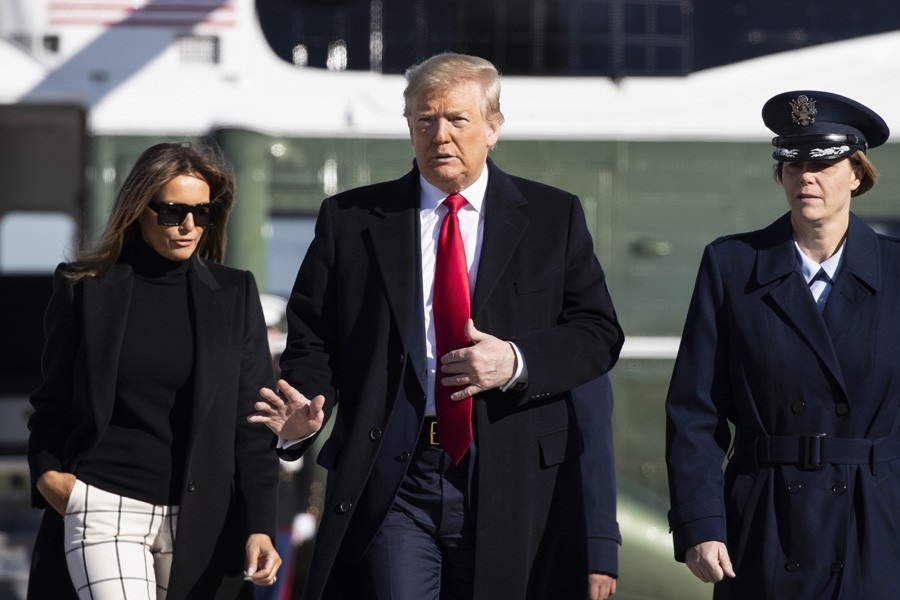Trump is 7th US President to visit India
| Date :24-Feb-2020 |

By Asim Kamal :
NEW DELHI,
WITH the hype around Donald Trump’s maiden visit to India as US President reaching a crescendo, here’s a trip down the memory lane on tours by previous American presidents. It all began about 60 years ago when Dwight D Eisenhower became the first US President to visit India to give a fillip to bilateral relationship which has seen many ups and downs to finally settle down in the last few decades as a strategic partnership. — Dwight D. Eisenhower — December 9-14, 1959 It was a landmark maiden visit by an American president and Eisenhower was greeted with a 21-gun salute when he landed in the national capital. He met the then President Rajendra Prasad and Prime Minister Jawaharlal Nehru. During his visit, Eisenhower delivered a public speech at Delhi’s Ramlila ground and addressed members of both Houses of Parliament.
He was also given a tour of the Taj Mahal in Agra with Prime Minister Nehru accompanying him to the iconic monument. Richard Nixon — July 31-August 1, 1969 Nixon’s visit to India could not match the euphoria and excitement of Eisenhower’s. He stayed in the country for less than a day and it achieved little with Nixon siding with Pakistan at the time of the 1971 Bangladesh War. — Jimmy Carter — January 1-3, 1978 Carter’s visit came just months after the Janata Party’s Morarji Desai succeeded Indira Gandhi as the country’s Prime Minister.
During his three-day visit, President Carter addressed Parliament and visited a village near Delhi which was later named after him. His visit was aimed at mending ties between India and the US against the backdrop of the 1971 Bangladesh War and the nuclear tests of 1974. — Bill Clinton — March 19-25, 2000 This was a presidential visit from America after over two decades and many regard it as a game-changing event during which Clinton and Prime Minister Atal Behari Vajpayee set the tone for deepening of bilateral ties. The visit also came at a tricky time in the backdrop of the US imposing sanctions on India following its 1999 nuclear test and the Kargil War. Clinton visited several popular tourist destinations like Agra, Jaipur, Hyderabad and Mumbai, besides Delhi. More importantly, the visit signified the beginning of the Indo-US strategic and economic partnership.
During the visit, Clinton signed the Joint Statement on Energy and the Environment and also addressed Parliament. — George W Bush — March 1-3, 2006 Bush and First Lady Laura Bush visited during Prime Minister Manmohan Singh’s first term in office. During his stay, Bush delivered a speech before a select audience at Delhi’s Purana Qila. But the visit will be remembered for the finalisation of the nuclear deal which later allowed India to pursue nuclear commerce. — Barack Obama — November 6–9, 2010 It was a visit that sent all the right messages for deepening and strengthening of strategic Indo-US ties. In a break from the past, Obama landed in Mumbai.
The message was not just for trade but a show of solidarity with the victims of the Mumbai attacks which had rocked India’s financial capital just two years prior to the visit. During the visit, Obama also expressed support for India’s bid for a permanent seat in a reformed and expanded UN Security Council. Michelle Obama, who had accompanied her husband on the trip, charmed Indians as she danced with underprivileged children at an event in Mumbai.
During the visit Obama, who had come with a large business delegation, attended the US.-India Business and Entrepreneurship Summit in Mumbai and addressed the Indian Parliament. — Barack Obama — January 24-27, 2015 In 2015, when Obama again visited along with First Lady Michelle, he became the first US President to visit the country twice while in office. It was indeed a trip of many firsts, as Obama was also the first US President to be the chief guest at India’s Republic Day Parade. He met President Pranab Mukherjee and held wide-ranging talks with Prime Minister Narendra Modi. Deepening of strategic ties in sectors such as trade, defence and climate change were at the centre of deliberations during the visit, which also saw an emphasis on the Indo-Pacific strategy.